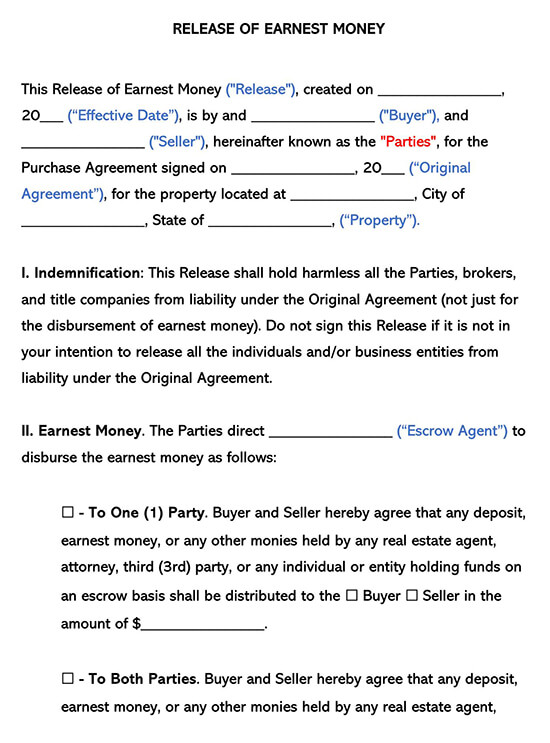This is a waiver document that ought to be signed by both parties prior to an earnest money deposit towards a home that may be released. The buyer and the seller may agree on the terms in which the earnest money may be returned to the buyer if the transaction fails before it is finalized. This can be due to the buyer’s voluntary backing up of the transaction or the inability to meet the terms of the deal. For instance, if the buyer gets into an agreement to buy a property contingent and when an inspection is conducted, and during the inspection, the roof is found to be in an improper condition such as leaking, then the buyer may request to cancel the agreement and request to release his/her earnest money.
The earnest money is usually head by a third-party or in an escrow account. The third-party holding the money is forbidden from releasing the money until the buyer and seller are in agreement or a local attorney gives a judgment.
Free Form

How to Handle the Disputes
The first thing to do is to consult the purchase contract over whether the money ought to be returned to the buyer, and if yes, then in what terms. The terms of the contract are there to govern the next step for both parties. The contract requires the parties involved to attend arbitration prior to bringing a proposal to recover the money. The parties can also consult the escrow holder since it has a standard procedure or can give a piece of advice on what would happen next. Most states have specific laws on how the escrow will handle the disputes on earnest money.
It is advisable to consult an attorney about your earnest money disputes if he/she is good at negotiations, especially if there is no need to take the matter to court. If the parties exhaust their pre-litigation requirement and have not yet reached an agreement, then you can take the matter to court.
Laws around Earnest Money
These laws are bound by the purchase contract between the two parties. There is the statute of frauds common in the U.S. law that requires particular contracts to be in the form of writing so as to be valid. In real estate contracts, the contract will be considered invalid if the contract to buy a real estate is not written and signed by both parties. Verbal commitments are not enough and will be difficult or impossible to prove in case of a dispute.
Basic Contents of the Release of Earnest Money Form
Below are the basic contents of the earnest money release form.
Date: This is the section that starts this document. Under the date, you indicate the month and day and then the year when this form has been filled.
Name of the buyer: You will be required to write down the name of the buyer as it appears in the original contract. If it involves more than one buyer, then indicate all their names.
Name of the seller: Indicate the name of the seller as it appears in the original contract.
Contract signature date: In this part, document the contract signature date to indicate when both parties signed the original contract.
Name of the Escrow Agent: If an escrow agent was involved in the deal, then you need to recognize the escrow agent by filling his/her name since they are the holder of the escrow account.
Property Details: Next, you should write the property details. Record the details as in the original contract, which includes the street, city, zip, and building number. Ensure you exhaust all the available details for this property.
The receiver of Earnest money: Next, you should indicate the receivers of the earnest money. You will be required to write down the name of the receivers to whom the escrow agent will release the earnest money.
Signature: Both parties require to sign this document along with mentioning the current of the signatures.
FAQs
It usually takes around 15-20 business days meaning not the calendar days. Escrow will not release the money back to you until the funds have cleared in their banks and have not bounced.
Either party can make a written demand to the third party, and it shall promptly give a copy of this demand to the other party. If the escrow agent does not get the written feedback to the demand within 15 days, then it may disburse the earnest money to the party who made the demand and should deduct the unpaid expenses.
When the broker accepts an Earnest money deposit, then they are the escrow agent, and the money is deposited in an escrow account.











